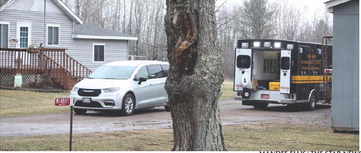County seeks compromise solution for housing authority
The continued presence of a local housing office in Taylor County will largely depend on compromise between the Taylor County Housing Authority (TCHA) and the county board over the office’s current and future role.
That was the outcome of a joint meeting between the TCHA board and the county’s executive committee held Monday afternoon.
At the March 19 county board meeting, there was a discussion about the potential ability of having the county contract with Spooner-based Northwest Regional Planning Commission to manage the county’s community development block grant (CDBG) housing fund program rather than TCHA. The county currently provides office space and a subsidy to TCHA through a budget line item to help keep the office open here.
The TCHA works with residents to address housing needs from providing emergency shelter through things like Salvation Army vouchers, to rental and mortgage assistance or emergency home repairs. They do this through several grant programs with the agency getting operational revenue based on the administrative fees on the grants and loans given out through the office. In addition, TCHA manages grants for the villages of Gilman and Rib Lake and has rental property from which it collects income.
NWRPC, of which the county is a part, also manages region-wide housing programs of which Taylor County residents are eligible to take part. According to housing administrator Jessica Mudgett, her office and NWRPC already cooperate on housing loans through the various CDBG grant programs with the regional funds being used to supplement locally available funds.
The CDBG program in question, was granted by the federal government to the state and in turn to the county. Money from the grant is loaned out to qualifying individuals with it repaid when the home is sold, refinanced, or the individual no longer occupies it. This money then goes back into the pool of local funds to be loaned out to other qualifying individuals.
Transferring control of this grant to NWRPC would put it in a much larger pool of funds, but the money would not be guaranteed to be available to go to Taylor County residents, but rather wherever there was a need anywhere within the 10-county region that covers all of northwestern Wisconsin.
County board member Sue Swiantek, who along with Lisa Carbaugh are the county’s representatives to the TCHA board, said there was confusion as to the role of the TCHA and the benefits of having a local office. She had requested the joint meeting between the two entities as a way to clear the air and set a path going forward.
Swiantek noted that in 1992, the county adopted a fair housing ordinance that goes on record stating that all persons have an equal opportunity for housing. She said she feels strongly about the benefits of having a local housing authority office from personal experience.
Swiantek related her experience in her earlier life when her husband was out of work here in the 1980s at a time she said “When you couldn’t buy a job.” She said they were helped by the housing authority so that they would not lose their property.
“Low income doesn’t mean you will always be low income, sometimes you need a helping hand,” Swiantek said.
For their part, executive committee members Scott Mildbrand and Mike Bub presented options for possible compromises. Mildbrand said he supported keeping the office here, but also noted that with the transition of Mudgett leaving the office for a new position in another county, it was a good time to look at options to reduce duplication and improve efficiency.
“It is the perfect time to reevaluate the relationship between the county and the housing authority,” Mildbrand said. He noted that his experience with consortiums with other counties is that initially people say they won’t work but that they end up working better when they happen.
One of the major concerns for TCHA is with having an assurance of stability with the office as they hire Mudgett’s replacement. TCHA is looking to wean away from the county’s cash subsidy and already took the step that going forward the office would be open 32 hours a week rather than 40 hours. Representatives said it was their plan to come to the budget process next fall asking for less money from the county.
Swiantek said they have a great candidate ready to continue operating the office and serving local residents and wanted to make sure they didn’t lose that candidate.
Bub said he saw the county having NWRPC manage the CDBG grant funds, but said he also saw an expanded mission for the housing authority beyond just being an emergency stop and looking to the future. “To me we need to look beyond today’s emergency and into the future,” Bub said. He said he would like the office to look at what the housing needs will be going forward into the future for the county so that they are being addressed. Bub gave the example of moving here 35 years ago with his wife and children and there being few housing options. He said that today there wasn’t much that was changed as far as availability of rental homes.
He said he saw it as a way to reduce the county budget, continue to have the space and have an expanded charge for what the housing authority does.
Mildbrand said he would support such a move noting that it maintains local services.
“I think it has to be a compromise, because it won’t be the status quo,” Bub said.
Part of the issue is the lack of clarity about the TCHA and what work it does and what the county board wants its representatives on the TCHA board to be doing.
TCHA Board member Joe Tomandl asked what the organization was doing wrong that the board felt the need to make changes? He also asked if it was simply a money thing.
Both Bub and Mildbrand were quick to assure the TCHA board members that there was nothing they were doing wrong, but that they were looking at ways to avoid duplication and improve efficiencies. Bub noted that in perspective with the overall county budget, the cost is not a significant amount.
After a lengthy discussion, the consensus was reached that TCHA would prepare a resolution to go to the county board meeting on April 16 with a proposal and that in addition the group would put together a one-page overview of what the office does to help educate county board members of its importance.
“Low income doesn’t mean you will always be low income,” — Sue Swiantek about the value of the Taylor County Housing Authority



